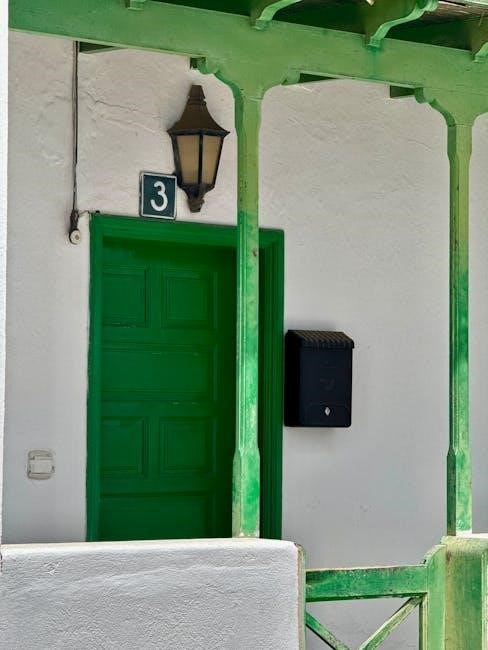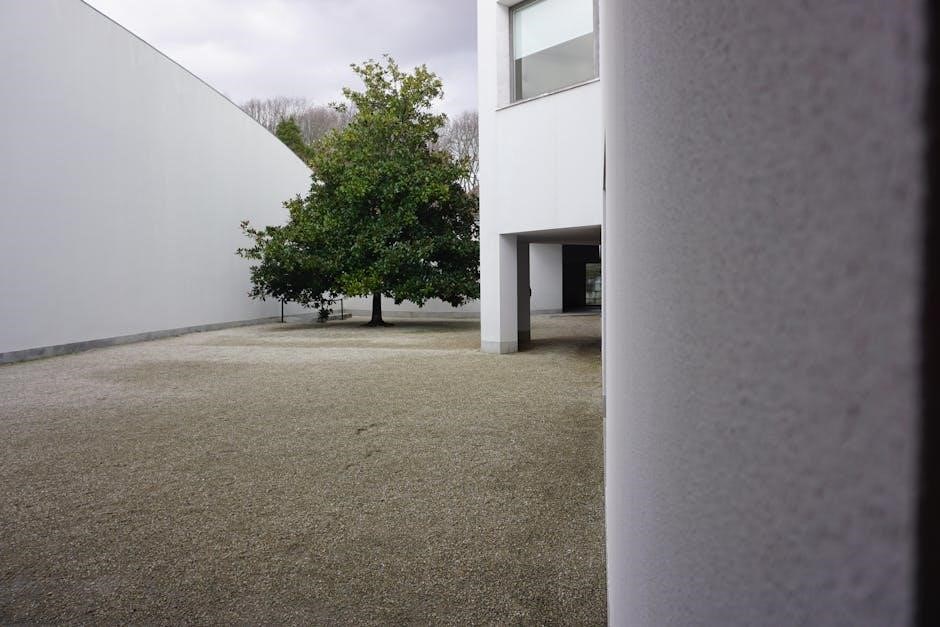A contrato de compraventa de casa is a legally binding document used to transfer home ownership. It outlines property details, payment terms, and obligations, ensuring transparency and legal protection for both parties involved in the transaction.
1.1. Definition and Purpose
A contrato de compraventa de casa is a legal document detailing the sale and transfer of a house. Its purpose is to establish a clear agreement between buyer and seller, outlining property details, payment terms, and obligations. This contract ensures legal protection for both parties, preventing disputes and providing a transparent framework for the transaction.
1.2. Key Parties Involved
The primary parties in a contrato de compraventa de casa are the seller and the buyer. The seller is the legal owner transferring property rights, while the buyer is the individual purchasing the house. Additional parties may include real estate agents, facilitating negotiations, and a notary public, ensuring legal compliance and witnessing the signing of the document.
1.3. Legal Requirements
A contrato de compraventa de casa must comply with local laws, ensuring the property’s legal status. A notary public verifies the document’s authenticity, and the contract must be registered with the relevant authorities. Both parties are responsible for paying applicable taxes and fees, such as property transfer taxes and registration costs, to finalize the transaction legally.

Structure of the Contracto de Compraventa
The structure includes detailed property descriptions, payment terms, and obligations of both seller and buyer. Legal clauses ensure transparency, protecting all parties involved in the transaction.
2.1. Property Description

The property description in a contrato de compraventa de casa is fundamental. It must include the address, size, boundaries, and any included features like furniture or appliances. This section ensures clarity and prevents future disputes by providing precise details about the house being sold. Both parties must agree on the property’s condition and specifications to avoid misunderstandings. This description is legally binding and essential for the contract’s validity.
2.2. Payment Terms and Conditions
The payment terms in a contrato de compraventa de casa specify the total price, payment methods, and timelines; It may include a deposit, installment payments, or full payment upon signing. The document should detail how payments will be made and when keys are handed over. Clear payment terms ensure both parties understand their financial obligations, reducing the risk of disputes. Receipts for payments are often required for transparency.
2.3. Seller’s Obligations
The seller must ensure the property is free of liens, debts, or legal disputes. They are responsible for delivering the house in the agreed condition, providing all necessary documentation, and transferring legal ownership. The seller must also disclose any known defects and facilitate a smooth transaction. Fulfilling these obligations ensures the buyer receives the property as agreed, minimizing potential legal or financial issues.
2.4. Buyer’s Responsibilities
The buyer must pay the agreed price, meet deadlines, and ensure all funds are legally sourced. They are responsible for reviewing the property’s condition and documentation, adhering to payment terms, and completing legal formalities. Buyers must also address any contingencies and fulfill their obligations as outlined in the contract to finalize the purchase smoothly and legally. This ensures a secure transaction for both parties.

Essential Clauses in the Contract
The contract must include clauses on price, payment methods, property condition, and contingencies. These ensure both buyer and seller rights are protected and obligations are clear.
3.1. Price and Payment Methods
The contract specifies the total price and acceptable payment methods, such as bank transfers or checks. It may include installments with due dates or a single payment upon signing. Both parties acknowledge receipt, ensuring clarity and avoiding disputes. Proper documentation of payment terms is crucial for legal validity and mutual agreement.
3.2. Property Condition and Warranty
The contract details the property’s condition, specifying if it is sold “as is” or with warranties. Sellers must disclose known defects, while buyers are entitled to a property free from hidden issues. Warranties may cover structural integrity or essential systems. This section ensures both parties agree on the property’s state, minimizing future disputes and ensuring compliance with legal obligations.
3.3. Contingencies and Conditions
The contract may include contingencies such as securing financing or completing inspections. Conditions outline specific requirements that must be met for the sale to proceed. These clauses protect both parties by allowing the contract to be suspended or canceled if predefined terms are not fulfilled. They ensure that all obligations are met and provide a clear framework for resolving potential issues.
3.4. Default and Breach of Contract
A default occurs when one party fails to meet contractual obligations. This can lead to a breach, triggering legal consequences. The contract outlines penalties and remedial actions for such cases. Understanding these clauses is crucial to avoid disputes and ensure both parties fulfill their commitments. Breaches may result in financial penalties or contract termination, emphasizing the importance of adherence to agreed terms.
Legal Aspects and Regulations
The contrato de compraventa de casa must comply with local laws, including property registration and tax obligations. Notary involvement ensures authenticity, while legal regulations protect both buyer and seller rights, preventing disputes and ensuring a lawful transaction process. Compliance with these aspects is essential for a valid and enforceable agreement.
4.1. Notary Public Involvement
The involvement of a notary public is crucial in a contrato de compraventa de casa. They verify the identity of both parties, ensure the contract’s legality, and witness the signing. In Spain and Colombia, notaries validate the document, ensuring compliance with regional laws. Their role guarantees the agreement’s authenticity and prevents future disputes, making it a mandatory step in the process. This formalization protects both buyer and seller, ensuring a legally binding transaction.
4.2. Registration of the Property
Registering the property is a mandatory step after signing the contrato de compraventa de casa. The buyer must submit the signed contract and supporting documents to the local property registry. This process ensures legal ownership and protects against future claims. In Colombia, it’s done at the Registro de Instrumentos Públicos, while in Spain, it’s registered with the Registro de la Propiedad. This step finalizes the transfer and provides legal security for both parties. Regional laws may vary, but registration is essential for official recognition of ownership. It ensures compliance with local regulations and safeguards the transaction’s legitimacy. Both buyer and seller benefit from this formal process, which is a critical part of the property transfer process in many countries. The registration process is overseen by government agencies to maintain transparency and accountability in real estate transactions. By completing this step, the buyer gains full legal rights to the property, and the seller relinquishes all claims to it. This ensures a smooth transition of ownership and prevents potential disputes. The registration process also updates public records, making the new ownership information accessible to relevant authorities and third parties. In summary, registration is a necessary step to complete the property transfer process and ensure legal compliance. It provides a formal record of the transaction and protects the rights of both parties involved. The process typically involves submitting the signed contract, proof of payment, and other required documents to the appropriate registry office. Once registered, the property is officially transferred, and the buyer can fully enjoy their new ownership rights. This step is crucial for maintaining legal certainty in real estate transactions and upholding the integrity of property records. By registering the property, the buyer ensures that their ownership is recognized by law, which is essential for future transactions or disputes. The registration process also helps prevent fraudulent activities by creating a public record of the property’s ownership history. In many jurisdictions, registration is accompanied by the payment of fees, which contribute to the maintenance of public records and legal services. Overall, the registration of the property is a fundamental aspect of the contrato de compraventa de casa process, ensuring legality, transparency, and security for all parties involved. It is a critical step that should not be overlooked, as it provides the final legal recognition of the property transfer and safeguards the rights of the new owner. The process is designed to be thorough, ensuring that all necessary documentation is in order and that the transfer is conducted in accordance with local laws and regulations. By completing this step, the buyer can have peace of mind knowing that their ownership is legally recognized and protected; The registration process also serves as a public notice of the property’s change in ownership, which can be important for tax purposes, insurance, and other legal matters. In conclusion, the registration of the property is an essential part of the contrato de compraventa de casa process, ensuring that the transaction is legally binding and that the buyer’s rights are fully protected. It is a necessary step that ensures the integrity of the property transfer and provides a clear record of ownership for future reference.
4.3. Taxes and Fees
In Colombia, a contrato de compraventa de casa involves various taxes and fees. The buyer typically pays the Impuesto de Registro (registration tax), which is 1% of the property’s value. Additional costs include notary fees (around 0.5-1%) and gastos de escritura (document preparation fees). The seller may pay the Impuesto de Alcabala (municipal transfer tax). These costs ensure legal compliance and finalize the property transfer.

Process of Creating the Contract
Creating a contrato de compraventa de casa involves drafting, negotiating, and signing the document. Both parties must agree on terms, ensuring clarity and legal compliance before finalizing the agreement.
5.1. Drafting the Document
Drafting a contrato de compraventa de casa involves preparing a detailed document outlining property specifics, payment terms, and both parties’ obligations. It is essential to include clear descriptions of the house, payment methods, and signatures. Legal professionals often assist in ensuring the contract adheres to local laws and protects both buyer and seller interests. Clarity and accuracy are crucial to avoid future disputes.
5.2. Negotiation and Agreement
Negotiation is a critical step where buyer and seller discuss terms, ensuring mutual understanding. Once agreed, the contrato de compraventa de casa is finalized, documented, and signed. This ensures clarity, legal compliance, and protection for both parties, preventing future misunderstandings. Proper negotiation and agreement are vital for a smooth transaction and successful property transfer.

5.3. Signing and Execution
The final step involves signing the contrato de compraventa de casa in the presence of a Notary Public, ensuring its legal validity. Both parties must review and agree to all terms before signing. The Notary authenticates the document, and the property transfer is finalized. This step is crucial for completing the sale and ensuring the contract’s enforceability under the law.

Importance of a Written Contract
A written contrato de compraventa de casa is legally binding, protecting both buyer and seller by clarifying terms, preventing disputes, and ensuring all parties’ rights are safeguarded throughout the process.
6.1. Avoiding Disputes
A written contrato de compraventa de casa serves as a clear reference point, minimizing misunderstandings. It outlines property condition, payment terms, and obligations, reducing the risk of disputes. By detailing all aspects of the sale, the document ensures both parties have a shared understanding, preventing potential conflicts and fostering a smooth transaction.
6.2. Protecting Both Parties
A contrato de compraventa de casa ensures both buyer and seller are legally protected. It outlines property descriptions, payment terms, and obligations, preventing disputes. The document includes warranties, contingencies, and compliance with legal requirements, providing a transparent and secure framework for the transaction. This ensures accountability and mutual protection, safeguarding the interests of both parties involved in the home purchase process.
6.3. Ensuring Transparency
A contrato de compraventa de casa promotes transparency by detailing property specifics, payment terms, and legal obligations. Both parties have clear visibility into the transaction, reducing ambiguity. The document includes all necessary disclosures, ensuring that both buyer and seller understand their responsibilities and the terms of the sale, fostering trust and accountability throughout the process.
Common Mistakes to Avoid
Common errors include incomplete property descriptions, unclear payment terms, and lack of legal consultation. These oversights can lead to disputes and legal complications for both parties involved.
7.1. Omissions in Property Description
Omissions in property description can lead to legal disputes. Vague details about boundaries, condition, or legal status may result in contract annulment. Ensure all aspects, including measurements and defects, are clearly stated to avoid future conflicts and ensure both parties are fully informed before finalizing the agreement.
7.2. Incomplete Payment Terms
Incomplete payment terms can lead to disputes and delays. The contract must specify the total price, payment methods, and timelines. Omissions, such as installment schedules or default consequences, can result in misunderstandings. Clearly defining how and when funds will be delivered ensures both parties are protected and the transaction proceeds smoothly without legal complications arising from ambiguity.
7.3. Lack of Legal Consultation
Neglecting legal consultation can lead to overlooked clauses and undefined terms. Legal experts ensure compliance with local laws and protect both parties’ interests. Without proper advice, disputes may arise due to unclear obligations or missed deadlines. Consulting a lawyer guarantees a comprehensive and enforceable agreement, safeguarding against future legal complications and ensuring all aspects of the contract are thoroughly addressed.

Templates and Tools
Utilizing PDF templates and online generators simplifies creating a contrato de compraventa de casa. These tools provide structured formats, ensuring all necessary details are included for a legally binding agreement.
8.1. PDF Templates for Contracto de Compraventa
PDF templates for a contrato de compraventa de casa provide a structured format, ensuring all essential details are included. These templates typically cover property descriptions, payment terms, seller and buyer obligations, and legal clauses. They are easily customizable, offering a professional and clear layout. Using a PDF template helps streamline the process, ensuring compliance with legal standards and avoiding errors in the agreement.
8.2. Online Generators and Software
Online generators and software simplify the creation of a contrato de compraventa de casa. These tools offer pre-designed templates, allowing users to input specific details and customize clauses. They ensure legal compliance and reduce drafting time, making the process efficient and accessible for both individuals and professionals.
Popular platforms provide features like real-time collaboration, digital signatures, and step-by-step guidance, ensuring accuracy and ease of use. These solutions are ideal for those seeking a streamlined approach to generating a comprehensive and legally sound contract.
8.3. Legal Consultation Services
Legal consultation services are crucial for ensuring the contrato de compraventa de casa is legally sound. Experts review and customize contracts, addressing specific needs and local regulations. They provide guidance on clauses, reducing risks and ensuring compliance. These services are essential for complex transactions, offering peace of mind and protecting both parties’ interests throughout the process.
Regional Variations
The contrato de compraventa de casa varies by region, with specific legal requirements in countries like Spain, Colombia, and other Latin American nations, reflecting local laws and practices.
9.1. Contracto de Compraventa in Spain
In Spain, the contrato de compraventa must be notarized and registered. It typically includes property details, payment terms, and warranties. Legal representation is often recommended to ensure compliance with Spanish real estate laws and to avoid future disputes. The contract must be in Spanish and signed by both parties in the presence of a notary public.
9.2. Contracto de Compraventa in Colombia
In Colombia, the contrato de compraventa must be notarized and registered. It outlines property details, payment terms, and seller obligations. Legal consultation is recommended to ensure compliance with local regulations and avoid disputes. The contract must be in Spanish and signed before a notary public.
9.3. Other Latin American Countries
In other Latin American countries, the contrato de compraventa varies by local laws. For example, in Argentina, the process involves notarization and registration, while in Peru, specific clauses may be required. Each country’s legal system dictates the format and requirements, emphasizing the need for local legal consultation to ensure compliance and protect both parties’ interests in the transaction.
The Role of Real Estate Agents
Real estate agents facilitate the process by connecting buyers and sellers, ensuring contract compliance, and negotiating terms to finalize the contrato de compraventa de casa smoothly.
10.1. Facilitating the Process

Real estate agents streamline the contrato de compraventa de casa process by connecting buyers and sellers, managing negotiations, and ensuring all legal and procedural steps are followed. They provide valuable insights, address concerns, and help parties reach mutually beneficial agreements, making the transaction efficient and stress-free for all involved.

10.2. Ensuring Contract Compliance
Real estate agents ensure the contrato de compraventa de casa complies with legal standards by reviewing property descriptions, payment terms, and clauses. They verify all details align with current regulations, protecting both parties from potential disputes. Their expertise guarantees that the contract is legally sound, providing peace of mind for buyers and sellers throughout the transaction.
10.3. Negotiating Terms
Real estate agents play a crucial role in negotiating terms between buyers and sellers. They facilitate discussions on pricing, payment conditions, and property inclusions. Agents use their expertise to balance both parties’ interests, ensuring mutually beneficial agreements. This streamlined process protects both sides and guarantees a smooth transaction, aligning with the legal and procedural requirements outlined in the contrato de compraventa de casa.
The contrato de compraventa de casa is a vital document ensuring legal protection and transparency for both buyers and sellers. Proper documentation and adherence to legal processes are essential for a smooth transaction.
11.1. Final Thoughts
The contrato de compraventa de casa is a cornerstone of real estate transactions, ensuring legal compliance and protecting both parties’ rights. Its clarity and precision are vital for avoiding disputes and safeguarding investments.
Without a properly executed contract, buyers and sellers risk legal complications and financial losses. This document is indispensable for a smooth and secure property transfer process.
11.2. Importance of Proper Documentation
Proper documentation in a contrato de compraventa de casa ensures transparency, legal compliance, and protection for both parties. It outlines property details, payment terms, and obligations, preventing disputes and financial losses. Accurate documentation is crucial for a smooth transaction, as it serves as legally binding proof of the agreement.
Without proper documentation, misunderstandings and legal complications can arise, making it indispensable for secure real estate transactions.
11.3. Next Steps After Signing
After signing the contrato de compraventa de casa, the document must be legalized by a notary public and registered with the local registry office. Both parties should ensure all taxes and fees are paid. The buyer should receive the keys and verify the property’s condition; Proper execution ensures the transfer is legally recognized, protecting both parties’ interests and finalizing the ownership process.

